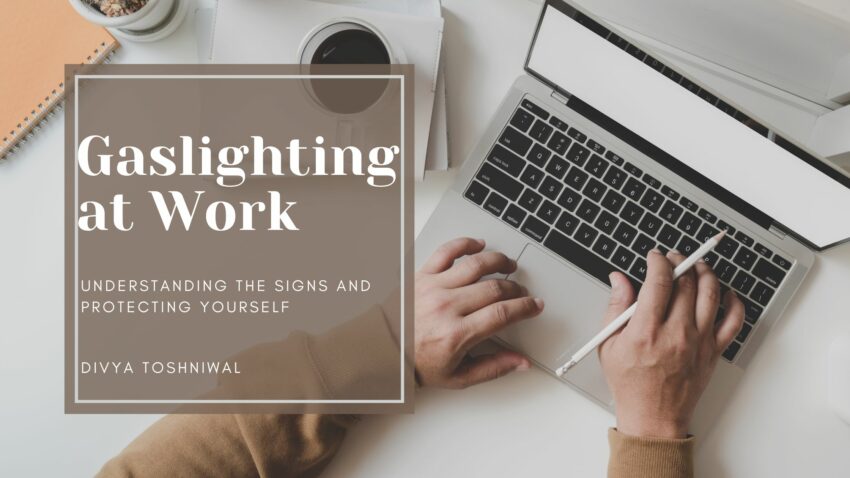If someone deliberately distorts the truth in order to undermine your perception or emotions to manipulate you into thinking the way that suits their needs, you may find yourself being subjected to gaslighting. Gaslighting can come from anyone who is in a position of power. It can be by a romantic partner, a family member, a colleague, or your boss.

Gaslighting At Work
Gaslighting entails creating an impression that you are unstable, irrational, and lacking credibility. It manipulates you into doubting the reality of what you see and experience, making you believe that you are fabricating it, it is all in your mind and that others won’t trust or support you.
Sarah, a diligent and hardworking employee, found herself entangled in a web of gaslighting orchestrated by her supervisor, Mark.
It started innocently enough with small comments meant to undermine her confidence. Mark would casually say, “Are you sure you can handle that project? It seems a bit too complex for someone at your level.” These seemingly harmless statements planted seeds of self-doubt in Sarah’s mind, making her question her own abilities.
As time went on, the gaslighting escalated. Mark began distorting facts and rewriting incidents that actually happened. During team meetings, he would take credit for Sarah’s ideas, leaving her confused and questioning her own contributions. When she tried to raise concerns about this, he swiftly dismissed her, saying, “You must be mistaken. I don’t recall you ever bringing up that idea.”
The gaslighting extended beyond professional matters, infiltrating Sarah’s personal life. Mark started spreading rumors about her, planting seeds of doubt in the minds of their colleagues. He subtly implied that she was unreliable, untrustworthy, and not a team player. As a result, Sarah felt isolated as though nobody would believe her side of the story.
In moments of confrontation, Mark expertly employed manipulation tactics. He would employ a charming demeanor, reassuring Sarah that he had her best interests at heart. “You’re just being too sensitive,” he would say with a smile. “I’m here to guide you and help you improve.”
Sarah’s mental health suffered greatly under the weight of gaslighting. She found herself constantly on edge, doubting her own perceptions and second-guessing every decision she made. The once confident and motivated employee became anxious, demoralized, and drained.
Such is the power of gaslighting. You do not realize until you have been surrounded by it. The manipulator plays so viciously that you may never be able to recognize that you are being manipulated and hence, it is extremely important that you are educated about gaslighting and that you learn to recognize the subtle signs of gaslighting at work.

Signs Of Gaslighting At Workplace
Denying or Invalidating Experiences: “You’re overreacting. That never happened. You must be mistaken.”
A gaslighter may deny or downplay an employee’s concerns about inappropriate behavior or harassment, making them question their perception and memory of the event.
Blaming the Victim: “It’s your fault. You’re too sensitive and can’t handle criticism.”
A gaslighter may shift blame onto an employee for their own mistakes or shortcomings, making them feel guilty and responsible for the gaslighter’s actions or behavior.
Twisting the Truth: “I never said that. You must have misunderstood me.”
A gaslighter may manipulate facts or distort previous statements to confuse and undermine an employee’s confidence in their own recollection and understanding.
Undermining Self-Confidence: “You’re not capable of handling this. I’ll take care of it.”
A gaslighter may repeatedly undermine an employee’s abilities, belittle their accomplishments, or assign them tasks below their skill level, making them doubt their competence and contribution.
Gaslighting through Isolation: “Nobody else has a problem with it. You’re the only one.”
They may isolate an employee by convincing them that their concerns or perspectives are invalid and that nobody else supports or shares their viewpoint, further diminishing their self-confidence.
Creating Doubt in Relationships: “You can’t trust anyone else. I’m the only one looking out for you.”
They may attempt to isolate an employee from their support network by instilling doubt in their relationships with colleagues or superiors, making the employee rely solely on the gaslighter for guidance and validation.
Manipulating Information: “I never received that email. You must not have sent it.”
A gaslighter may manipulate or selectively withhold information to make an employee question their memory or doubt their own actions, causing confusion and undermining their credibility.
Impact of Gaslighting On Employee Mental Health
- Gaslighting causes emotional distress and can lead to heightened anxiety, depression, and feelings of worthlessness.
- Gaslighting erodes self-esteem by making individuals doubt their abilities, judgment, and overall self-worth. The consistent invalidation and undermining of their thoughts and experiences can leave them feeling inadequate and unimportant.
- Gaslighting creates a stressful work environment as employees constantly feel on edge because of gaslighter’s manipulative tactics. This chronic stress can lead to physical symptoms such as headaches, insomnia, and digestive issues. [ Also read: 12 signs of stress and ways to deal with stress ]
- Gaslighting at work often isolates individuals from their support networks. Gaslighters may create doubt about the victim’s credibility, making them feel like nobody else will believe or support them. This can lead to depression and loneliness.
- The constant gaslighting and manipulation disrupt the clarity of thought and can lead to difficulties in performing tasks effectively. This impacts the employee’s decision-making abilities and cognitive functioning.
- Gaslighting damages an individual’s trust in themselves and others. Victims may struggle to trust their own judgment and intuition, and this lack of confidence can spill over into other areas of their personal and professional lives.
- In some cases, gaslighting at work can also lead to post-traumatic stress symptoms. The continuous manipulation, emotional abuse, and undermining of reality can result in flashbacks, hypervigilance, and a heightened state of arousal, similar to what individuals experience after traumatic events.
It is important to acknowledge the impact of gaslighting at work on mental health and provide support to individuals who have experienced or are experiencing gaslighting at the workplace. Creating a safe and supportive environment that promotes open communication, validation, and empowerment can help deal with the damaging effects of gaslighting and foster a healthier workplace culture.
How To Protect Yourself From Gaslighting At Work
You read Sarah’s story above but that was not the end to it.
Sarah’s breaking point arrived when she confided in a trusted coworker, Alex, who had noticed the subtle signs of gaslighting. Alex validated Sarah’s experiences and encouraged her to document instances of gaslighting. Together, they compiled a detailed record of conversations, meetings, and witnessed incidents.
Armed with evidence, Sarah mustered the courage to confront the situation head-on. She scheduled a meeting with the HR department, providing them with her documented experiences. Sarah expressed how the gaslighting tactics had affected her mental well-being and created a toxic work environment.
The HR department took her concerns seriously, launching an investigation into the matter. Through interviews and reviewing the evidence, they discovered a pattern of gaslighting behavior by Mark. As a result, the company implemented policies to address workplace gaslighting and provided training for employees on recognizing and addressing such behaviors.
Sarah’s bravery in standing up against gaslighting at work not only led to justice being served but also created a safer and more supportive work environment for herself and her colleagues. Her story became a powerful reminder that together, employees can combat gaslighting and foster a workplace culture built on trust, respect, and empathy.
You can read about how to protect yourself from gaslighting at work in the following story:

